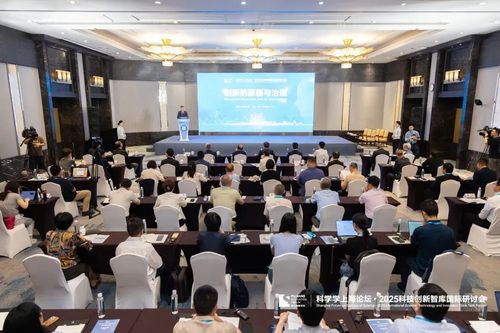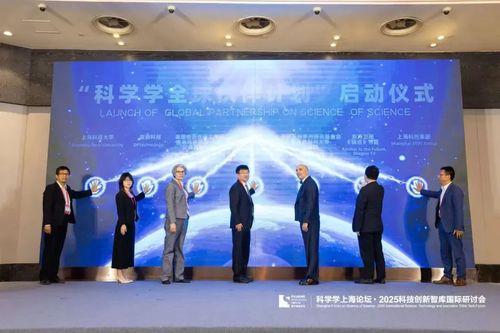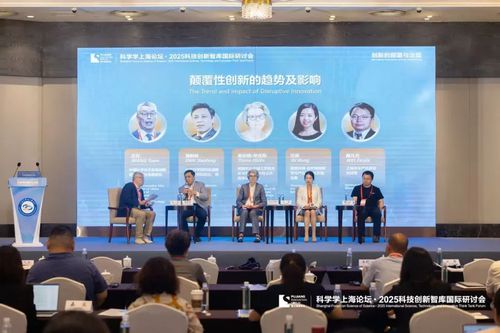Shanghai Forum on Science of Science·2025 International Science, Technology and Innovation Think Tank Forum, a sub-forum of Pujiang Innovation Forum, was held in Shanghai from June 26 to 27, 2025. Centering on the theme “Disruptive Innovation and its Governance”, the forum aimed to create a platform for theoretical exploration, intellectual exchange, in-depth discussion and collaboration in the study and practice of Science of Science in the new era. Prominent scientists, policy experts and outstanding young scholars from leading global S&T innovation think tanks gathered to discuss and exchange ideas on the development of Science of Science in the new era. Over 300 experts attended the conference.
Among the distinguished guests were Li Meng, Member of the 14th CPPCC National Committee (Committee on Education, Science, Health & Sports), former Vice Minister of Ministry of Science and Technology; Lin Zhongqin, Academician of the Chinese Academy of Engineering, former President of Shanghai Jiao Tong University; Xia Kejia, Deputy Secretary-General of the Shanghai Municipal Government; Liu Dongmei, Chair of the forum, Secretary of the Party Committee of Chinese Academy of Science and Technology for Development (CASTED); Pan Jiaofeng, President of Institutes of Science and Development, Chinese Academy of Sciences; and Wang Yuan, former Executive Vice President of CASTED. The opening ceremony was presided over by Luo Dajin, Director of the Shanghai Municipal Commission of Science and Technology.
At the opening ceremony, Xia Kejia emphasized that S&T innovation think tanks are crucial forces in Shanghai’s development as an international science and innovation center. They should focus on studying the laws of scientific development, providing strategic advice for major S&T decisions, and especially playing a key advisory role in identifying critical scientific issues, deepening the strategic layout of core innovation domains, promoting deep Industry-University-Research Collaboration, and enhancing the governance efficiency.
Li Meng delivered a report titled “Deepening the Understanding of Disruptive Innovation through the Practice of Efficiency Revolution in Large Models”. He argued that theoretical innovation and engineering optimization will alternately drive disruptive innovation, with engineering innovation itself also capable of achieving disruption. Concurrently, he stressed the need to consider disruptive innovation alongside its potential hazards.
During the keynote report session, Lin Zhongqin presented “The Governance and Value Realization of Technological Innovation”, noting that global S&T development has entered a “nonlinear acceleration period” with S&T governance models undergoing rapid transformation. He asserted that only by proactively embracing change and deepening institutional innovation can nations seize the initiative and lead development in the new round of technological revolution.
Liu Dongmei presented “Disruptive Technologies and ‘Creative Destruction’: Evolutionary Characteristics and Policy Implications”, noting that profound changes in China’s internal and external conditions are driving the emergence of disruptive technologies and accelerating the process of “creative destruction”. She emphasized the need to increase knowledge supply while strengthening predictive capabilities and strategic deployment planning for disruptive technologies.
Pan Jiaofeng presented “New Industrial Revolution and Disruptive Innovation: Accelerating the Creation of Emerging Pillar Industries”. He pointed out that the formation of future industries relies on disruptive innovation. This follows an internally coherent logic, with predictable trends and navigable directions—though specific forms or products are ultimately determined by market selection.
Nearly 20 experts, including Prof. Otto Heinrich Herzog, International Member of Chinese Academy of Engineering; Prof. Jin Yaochu, Member of Academia Europaea and Professor of Westlake University; Prof. Diana Hicks from the Georgia Institute of Technology; Mei Yonghong, Executive Director, Strategy Committee Chair of BGI Group; Prof. Naohiro Shichijo from Hitotsubashi University; Tan Chuan Seng, Deputy Director of the International Industry Centres, Agency for Science, Technology and Research; Chen Haipeng, Vice Director (Presiding) of the Shanghai Institute for Science of Science, delivered insightful speeches on topics such as AI, governance and value realization of technological innovation, the U.S. policy ecosystem, institutional incubation and investment models, and future industries, sparking lively discussions.
During the panel discussion session, Dean Wang Yuan was widely applauded by symposium attendees for stimulating exceptional scholarly exchanges. Experts and young researchers engaged in lively and in-depth exchanges on “The Trend and Impact of Disruptive Innovation” and “Jointly Promote Future Oriented Governance of Technological Innovation”, followed by an interactive Q&A with the audience.
At the forum, the Shanghai Institute for Science of Science, building on last year’s Shanghai Initiative on Science of Science, launched the “Global Partnership on Science of Science” in collaboration with representatives from global S&T, business, education, finance and media sectors. This initiative aims to pool “Science of Science+” synergies, advance science communication, and co-create a world-class platform for global S&T innovation dialogue.
The forum not only provided a high-level platform for in-depth exchange and collaboration but also emerged as a frontier hub for theoretical exploration in international Science of Science research and practice. By delving into cutting-edge issues of disruptive innovation and governance, it aggregated the latest developments in global S&T strategy research, policy formulation, and implementation, fostering an inclusive and sustainable governance system for disruptive innovation.
As a key themed sub-forum of the Pujiang Innovation Forum, the International Science, Technology and Innovation Think Tanks Forum has now been held for ten sessions. It aims to create a platform of dialogue for international think tanks of S&T innovation, with a special focus on China’s innovation and the development of Shanghai as an international science and innovation center. The forum seeks to provide ideas and suggestions, and promote think tanks of S&T innovation worldwide to enhance the intellectual power of research, decision-making influence and social communication.






 E-mail Alerts
E-mail Alerts

 沪公网安备 31010402001155号
沪公网安备 31010402001155号